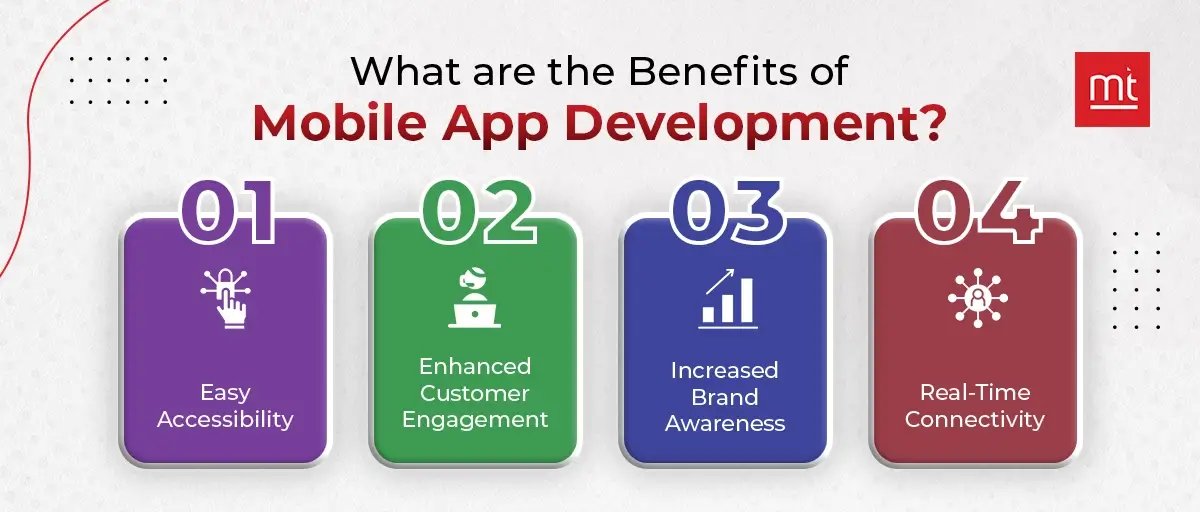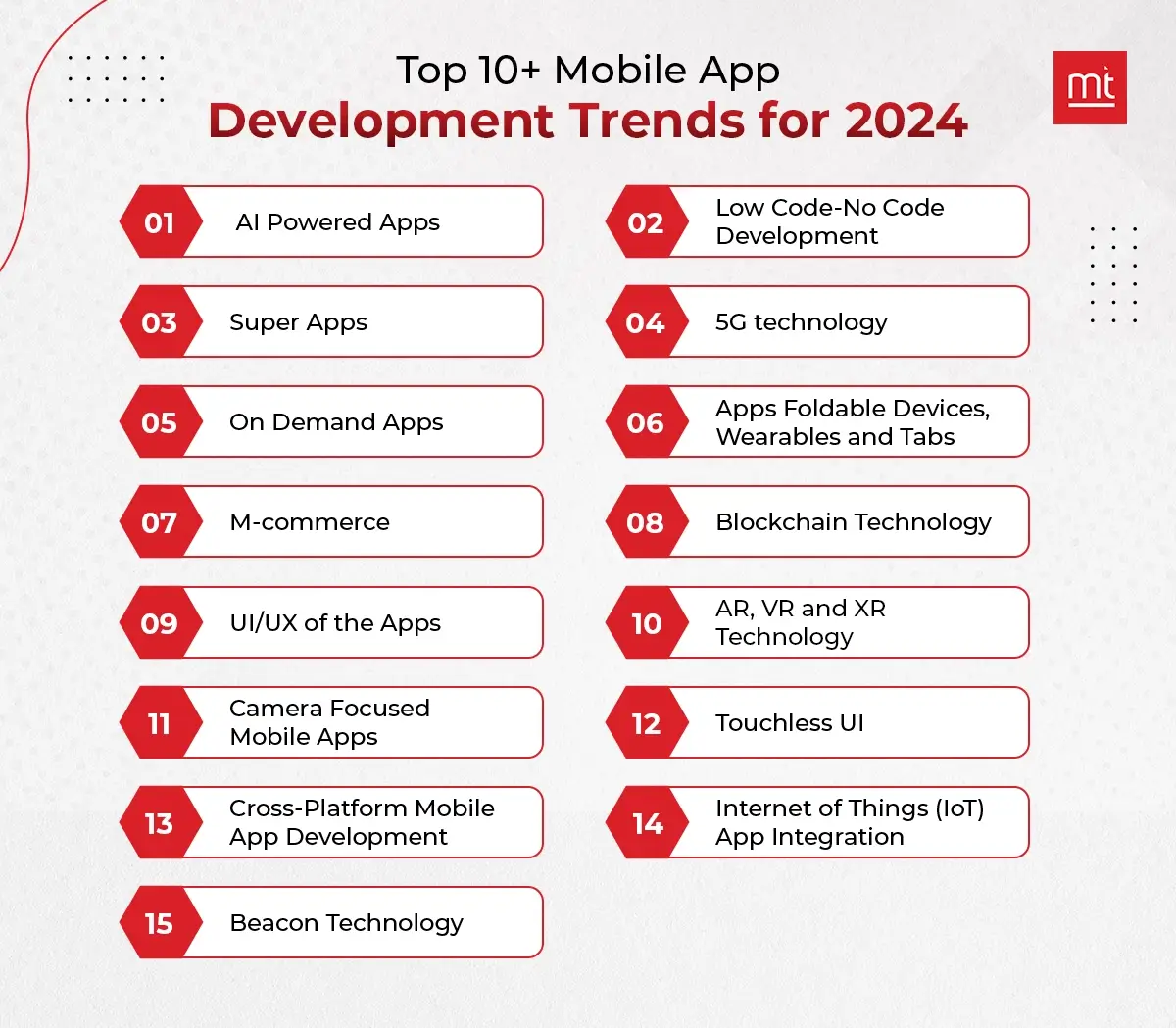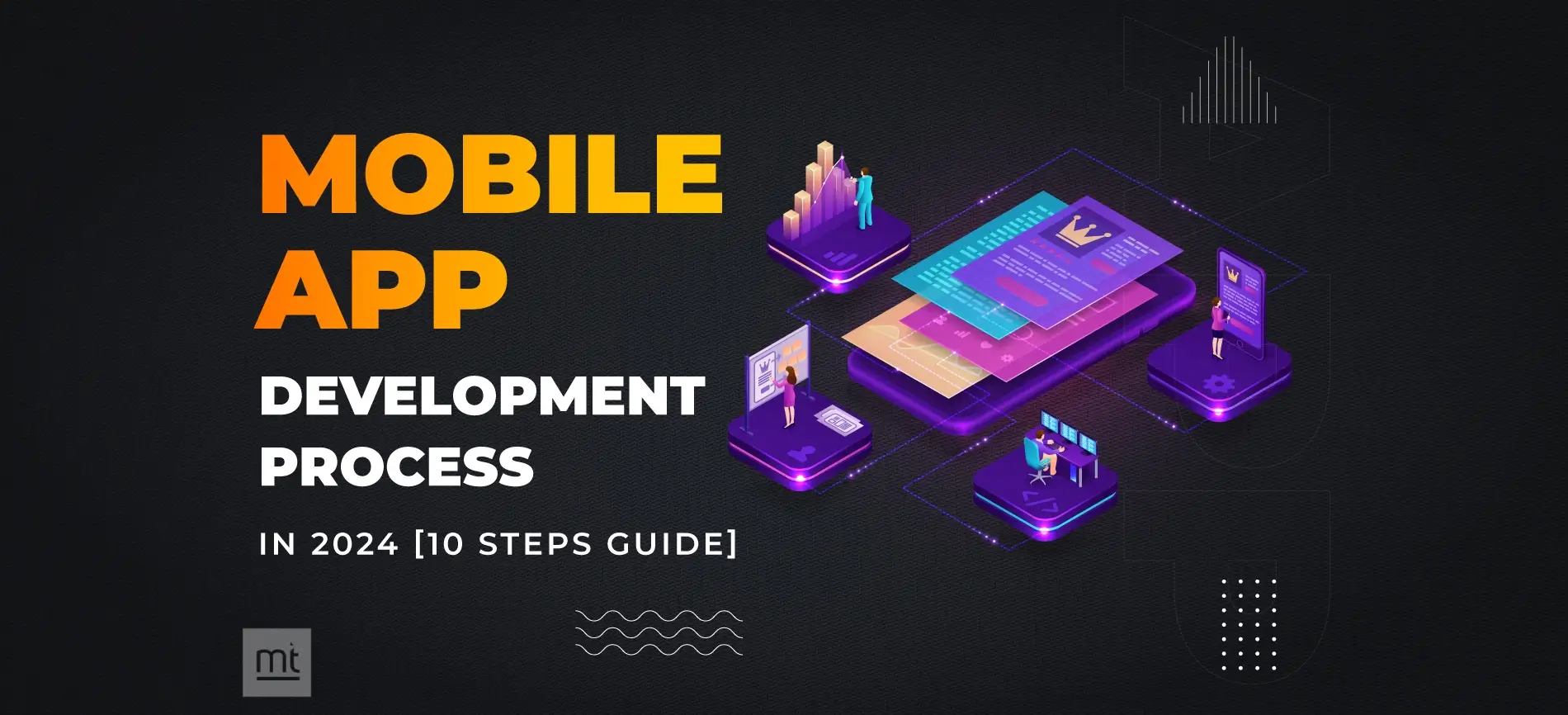Introduction
In the ever-evolving world of technology, mobile apps hold the power to transform industries, redefine user experiences, and connect people worldwide. As we enter 2024, mobile app development is anticipated to progress higher with the continuous evolution of technology. Statista has projected the worldwide mobile market growth by 8.83% in the years 2022-2027.
Join us on this journey as we unveil the groundbreaking trends that will shape the future of mobile app development in 2025.
What is Mobile App Technology?
Mobile app technology is the driving force behind the plenty of applications that reside on our mobile devices. From social media platforms that connect us with loved ones to banking apps that empower us to manage our finances on the go. Mobile apps have reshaped the way we communicate with technology and the world around us.
The mobile app technology runs with a symphony of intricate coding, innovative designs, and user-centric features. Developers pour their passion and expertise into crafting apps that not only perform flawlessly but also captivate our senses and enhance our daily lives. The beauty of mobile app technology lies in its boundless versatility.
What are the Benefits of Mobile App Development?

#1. Easy Accessibility
Mobile apps bring business to the fingertips of their customers with a simple tap. Gone are the days of clumsy websites and complicated navigation. With mobile apps, it keeps you just one click away.
#2. Enhanced Customer Engagement
Applications make people feel like they are part of an exclusive club with personalized and interactive user experiences. Push notifications, loyalty programs, and interactive features keep them engaged and coming back for more.
#3. Increased Brand Awareness
In the vast digital landscape, mobile apps serve as beacons of any brand. With a captivating app icon and engaging content, it leaves a lasting impression, making your brand unforgettable.
#4. Real-Time Connectivity
Mobile apps open the doors to instant and seamless communication. Whether it's customer queries, order tracking, or appointment scheduling, it helps to connect in real time. No more waiting on hold or endless email chains.
How Mobile App Trends Affect the Industry?
Mobile app trends are witnessing substantial investment in development services, promising various industries a growth in customer engagement and revenue. High-speed networks will enable data-intensive mobile applications across telecom, healthcare, transportation, entertainment, education, and beyond.
Wearable technology, once limited to fitness, is now making waves in fashion, with clothing fabrics going digital and gadgets adorning belts. Multiple companies offer services to monitor transport vehicle performance using IoT devices. IoT tracking devices like Apple's AirTag and Google's Nest are seamlessly integrated with mobile apps for everyday convenience.
The gaming industry, which popularized AR/VR, aims to enhance user-friendliness and boost adoption. These latest app development trends are rising with the potential to transform industries and revolutionize our daily lives.
Top 10+ Mobile App Development Trends for 2025

1. AI-Powered Apps
In the world of mobile apps, AI's arrival is like the sunrise of a new era. It is not just about convenience; it is about creating apps that deeply understand their users. With progressing technology, our mobile apps will not merely respond to our commands; they will evolve into intuitive companions that anticipate our needs, recognize our emotions, and adapt seamlessly to our every move.
Amazon is successfully using AI/ML to enhance shopping experiences. Whenever a user makes any purchase with Amazon, their data gets stored and as the user opens the app again, they get redirected to the recommendations page.

Benefits of AI-Powered Apps:
- More powerful app authentication.
- Real-time language translation.
- Improved security with facial recognition.
- Emotion recognition.
- Automated reply functions.
2. Low code-no code development
With the significant employment challenges in the United States and a global shortage of skilled app developers, businesses are increasingly likely to embrace low-code/no-code technologies for app development.
These platforms empower tech-savvy employees in various business roles to swiftly acquire coding skills. In the upcoming year, we may witness AI taking on a more active role in coding. While GitHub Copilot previously focused on generating cleaner code, it can now compose entire code sections based on developer explanations. The developer outlines the rationale, and Copilot assembles the code accordingly.
Additionally, it's crucial to note the shift of Integrated Development Environments (IDEs) to the cloud, fostering increased integration, automation, and productivity in software development processes.
Zoho Creator, Mendix, and Microsoft-powered apps are some examples that use low-code no-code technology.

Benefits of low code-no code:
- Increased Agility
- More flexibility
- Lower Costs
- Faster Results
- Enhanced Innovation
3. Super Apps
In the period of digital convenience, 2024 marks the rise of the super app, a revolutionary concept that's poised to redefine the way we interact with technology. Imagine an all-in-one platform that seamlessly integrates a myriad of services, from e-commerce and social networking to entertainment, gaming, messaging, and payments, all within a single, easy-to-use interface.
WeChat, Grab, and Gojek are just a few examples of these trailblazing apps that are already making waves in the market.

Benefits of Super Apps:
- Wider audience reach
- High customer engagement
- Increase in the number of revenue sources
- Strong brand positioning
- Cost reduction
4. 5G technology
5G technology has revolutionized the world of mobile app development, redirecting it into a new age of connectivity and possibilities. With its lightning-fast speeds, low latency, and increased network capacity, 5G has become a game-changer for developers aiming to create cutting-edge mobile applications.
The enhanced data transfer rates enable the seamless streaming of high-quality content, augmented reality experiences, and immersive virtual reality applications. Moreover, the low latency provided by 5G ensures quicker response times, making real-time interactions smoother than ever.
Developers can now explore and implement innovative features, such as advanced machine learning algorithms and complex computational processes, without compromising performance.

Benefits of 5G Technology:
- Improved customer engagement.
- Enhanced brand visibility.
- Seamless customer experience.
- Access to insightful analytics.
5. On-Demand Apps
The on-demand mobile app market is about to explode, reaching a staggering $335 billion by 2025. And it's not just about convenience - these apps are supposed to revolutionize how businesses operate, provide services, and make decisions.
Imagine being a healthcare provider in urgent need of a specialized medical device for a critical procedure. Or a logistics manager striving for real-time route optimization. Or a fintech pioneer requiring rapid, secure data analysis for game-changing financial decisions. On-demand apps are your secret weapon, your digital guardian angels.
On-demand streaming apps like Netflix or on-demand delivery apps like Blinkit are successful examples indicating the growth of on-demand mobile applications in general.

Benefits of On-demand Apps:
- Highly efficient and cost-effective.
- Improved customer service.
- Accessibility to a wider range of services.
- Increased customer loyalty.
- Increased market reach and visibility.
6. Apps Foldable devices, wearables, and tabs
In the fast-changing world of mobile technology, foldable devices have emerged as the latest trend, promising to revolutionize the way we interact with our phones. These innovative devices, like the Samsung Galaxy Fold, Huawei Mate X, and Motorola Razr, have captured the imagination of consumers with their ability to transform from compact handheld devices to large-screened media powerhouses.
While foldable devices currently occupy a small segment of the smartphone market, their popularity is expected to skyrocket in the coming years. According to a 2019 study, a substantial percentage of iPhone and Android users expressed excitement about purchasing foldable phones. This growing demand is expected to drive shipments from 3.2 million units in 2019 to an estimated 50 million units by 2023.
For app developers, the advent of foldable devices presents both opportunities and challenges. Resellers and content creators must now consider these devices when designing and updating apps, ensuring that the display seamlessly adjusts to the changing screen size.

Benefits of Apps Foldable devices, wearables, and tabs:
- Ability to compress and expand screen size.
- Seamless transition between different tasks.
7. M-commerce
With mobile payment apps, the realm of digital money is now an open door to its full potential. From shopping sprees to bill payments, from effortlessly transferring funds to paying installments, these apps serve every need. User-friendly and easy to set up, they empower users to transact with a few taps.
Some of the examples of m-commerce are Amazon mobile app, Apple Pay, Google Pay, Samsung Wallet, etc.

Benefits of M-commerce:
- User-friendly and easy to set up.
- Convenient to use.
- Secure.
8. Blockchain technology
In the generation of mobile technology, blockchain is supposed to revolutionize transactions and data exchange. As we step into 2024, the adoption of this secure and transparent platform will soar, eliminating intermediaries and opening doors to innovative features like smart contracts, decentralized apps, and cryptocurrency wallets.
This transformative technology tackles challenges and unveils opportunities, promising a significant impact on the future of mobile app development.

Benefits of Blockchain technology:
- Simple and flexible.
- Increased reliability.
- Improved transparency.
- Safeguard Digital Information That Requires Multiple Users
- Create A Digital Identity For Users
- Improved data security.
9. UI/UX of the Apps
One of the most positive effects of a mobile application on IT is a positive user experience. With mobile apps, we can effortlessly obtain detailed insights into the data utilized and content accessed on devices. This real-time monitoring of data usage empowers users to track their online activities and patterns.
In the workplace, these applications are invaluable tools for businesses, providing comprehensive data usage insights and empowering companies to make informed decisions. Utilizing these applications is essential for organizations seeking to optimize their IT infrastructure and enhance productivity.

Benefits of UI/UX of the apps:
- Enhances User Engagement.
- Improves User Retention.
- Boosts App Downloads.
- Increases Revenue.
- Creates Brand Awareness.
10. AR, VR, and XR technology
As 2024 unfolds, the merging of Augmented Reality (AR) and Virtual Reality (VR) technologies is reshaping our digital interactions with the physical world. Transcending the gaming niche, these immersive technologies are supposed to make great impacts across various industries.
Remember Apple's Vision Pro unveiling? That was merely a taste of what was coming ahead. AR/VR has already left its mark on social media and interior design, but it's the industries like Travel, Education, Medicine, Entertainment, Retail, and E-commerce that will witness transformative change.
The impact extends beyond the user experience. In 2024, developers will prioritize building applications that leverage edge computing. This means faster data processing and reduced latency, leading to robust Extended Reality (XR) applications, offering a spectrum of experiences ranging from immersive VR to subtle AR enhancements.

Benefits of AR, VR, and XR technology:
- Improved training outcomes.
- Reduced costs.
- Enhanced customer experiences.
- Improved communication and collaboration.
- Improved sustainability.
11. Camera-focused mobile apps
The work-from-home revolution has propelled video calls into the mainstream. In just one week of March 2020, videoconferencing apps shattered records with a whopping 62 million downloads.
Established platforms like Google Meet, Zoom, and even the venerable Skype have witnessed a meteoric rise in usage. Similarly, video-centric social networks such as YouTube and Facebook Watch have soared in popularity.

12. Touchless UI
Did you know that by the end of 2023, half of all major business apps will incorporate touchless experiences? Gartner predicted this seismic shift in the app landscape, signaling the dawn of hands-free interactivity.
Biometrics has led the touchless revolution, allowing us to seamlessly sign in and access secure apps with just a facial scan. From banking to document sharing, biometrics is transforming the way we interact with sensitive data.
But the evolution doesn't stop here. Smartphones and apps are liberating themselves from the constraints of touch, embracing new avenues of interaction. Motion sensing and gesture control technologies are taking center stage, granting us control with just a wave of the hand or stylus.

Benefits of Touchless UI:
- More hygienic
- More efficient
- More convenient
13. Cross-Platform Mobile App Development
Flutter and Kotlin are emerging as game-changers in 2024. These cutting-edge platforms are capturing the attention of developers worldwide with their impressive array of features and benefits that are revolutionizing the way apps are built.
Flutter, with its blazing-fast rendering engine and intuitive widget-based UI framework, enables developers to craft captivating user experiences with remarkable ease. On the other hand, Kotlin Multiplatform unleashes the power of a unified codebase, empowering developers to effortlessly build apps that run flawlessly across multiple platforms.

Benefits of Cross-Platform Mobile App Development:
- Enhanced performance.
- UI versatility.
- Unmatched convenience.
14. Internet of Things (IoT) App Integration
Statista projects that revenue from IoT-related technologies will reach a staggering $1,387 billion by the end of 2024. Hence, we can anticipate a surge in mobile app development centered around the IoT. Household devices, automobiles, display devices, smart gadgets, and healthcare are all sectors to watch closely.
The IoT has revolutionized the way we interact with technology, enhancing convenience and efficiency in our daily lives. As technology continues to evolve, the integration of IoT and mobile app development holds immense promise for shaping the future of connected devices.

Benefits of Internet of Things (IoT) App Integration:
- Increased security
- Enhance productivity
- Cost efficiency
- Location independence
- Business innovation
15. Beacon technology
Embraced across sectors like retail, healthcare, and hospitality, beacon technology enhances mobile app functionality. Since their introduction in 2013, beacons have undergone remarkable advancements.
Beacons also monitor buyer behavior, detecting users spending time in specific aisles. The app can then trigger push notifications later, promoting related products.
![]()
Benefits of Beacon technology:
- Proximity marketing
- Enhancing the customer experience within mobile apps.
How Can Manektech Help You Stay Ahead With Mobile App Trends?
In an era where technology weaves through every aspect of our lives, Manektech emerges as a beacon of innovation, guiding businesses into the digital realm with expertise and precision. Our team of mobile app development experts is not just a collection of programmers; they are artists crafting masterpieces of technology.
We are not merely a service provider, but a catalyst for growth, a driving force propelling businesses to unimaginable heights. We have worked with hundreds of clients in a variety of industries including healthcare, energy, consumer products, and more.
Wrapping Up
Here we come to the end of the list where we have predicted the mobile app development trends that will rule in 2024. With the changing trends we must say that the mobile app development market is evolving every day to become smarter and advanced in all possible manners. Advanced technologies like AI, beacon, IoT, etc have become integral parts of mobile app development systems.
To follow the trends and stay updated in the market you have to keep your mobile apps nourished with the latest technologies covering the market. What other company than Manektech can be your growth partner to assist you in this journey?
So, what are you waiting for? Initiate a conversation with our experts to explore your next app idea and embark on a journey of innovation. Together, we will transmute your vision into reality.

FAQs
Q1. What are the trends in the mobile application market?
Ans: 5G's lightning-fast connectivity, wearable apps, Artificial Intelligence (AI) and Machine Learning (ML) algorithms, Augmented Reality (AR), and Virtual Reality (VR) will be the highlights of the year 2024.
Q2. What is the future of mobile app development?
Ans: AI-powered apps are reshaping industries. They are the silent heroes behind the scenes, tirelessly analyzing data, recognizing patterns, and making predictions that would astound even the most brilliant minds.
Q3. What are the 5 key benefits of mobile app development?
Ans: The 5 key benefits of mobile app development are: convenience, brand visibility, customer engagement, drive sales and revenue, and gather valuable customer insights.
Q4. Is app development in demand in 2024?
Ans: With more businesses embracing mobile technology and consumers spending countless hours on their smartphones, the need for innovative and user-friendly app development is greater than ever.
Q5. What is the rising demand for mobile developers?
Ans: App development companies are always on the lookout for talented mobile developers. The high demand for mobile apps across all industries increases the demand for developers.
Q6. Is 5G technology the future of mobile application development?
Ans: 5G, the fifth generation of wireless technology, is not just a faster internet connection; it is a gateway to a new era of connectivity. YES, it is the future of mobile app development.
Q7. What is the latest technology for mobile app development?
Ans: The latest technologies for mobile app development are Flutter, React Native, Kotlin Multiplatform Mobile (KMM), 5G Networks, AI and ML, AR and VR, Blockchain, and Decentralised Apps.
Q8. Will mobile app developers be replaced by AI?
Ans: Some envision a future where AI's prowess in coding and automation leaves human developers obsolete, while others believe that the creative and intuitive nature of app development will always require a human touch.
About Author
Subscribe to Our Newsletter!
Join us to stay updated with our latest blog updates, marketing tips, service tips, trends, news and announcements!



















